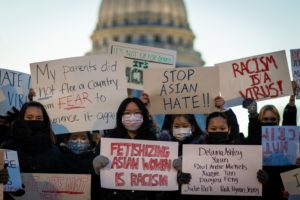
Despite the cold weather, the streets surrounding the capitol were filled as they were this past summer with the chanting of protestors. However, this time, a different chorus could be heard: “When Asian lives are under attack, what do we do?”
“Stand up fight back.”
Yesterday evening, hundreds of students and community members joined in together outside of the Madison Civil Rights Department for a “March For Asian Lives” presented by organizer Basal Jones in partnership with the UW-Madison BIPOC Coalition.
The protest comes in the wake of deadly shootings at three Georgia span this past Wednesday, killing eight. Of those eight victims, six were of women of Asian descent.
The terrorist has been identified by police as 21-year old Robert Aaron Long.
The victims of one shooting, in Acworth, Georgia, have been identified as Delaina Ashley Yaun, 33, of Acworth; Paul Andre Michels, 54, of Atlanta; Xiaojie Tan, 49, of Kennesaw; and Daoyou Feng, 4. The victims of attacks in Atlanta have not been publicly identified.
“We’ve been continuing to see a trend in hate crimes perpetrated against the Asian-American community, up to 150% is what NBC said, and it’s getting to the point of ridiculousness,” Jones said. “These attacks are oftentimes unprovoked, they’re so racially motivated, and it’s disgusting.”
According to a recent report released by the Center for the Study of Hate and Extremism at California State University, San Bernardino, in 16 of America’s largest cities hate crimes against Asian people rose by nearly 150 percent.
“I feel like I’ve been shouting out into the void for the past year about what would happen if like the xenophobic language and the racist language regarding Coronavirus kept up and if racism kept going unchecked, which it did,” said Tarah “Cherry” Stangler,member of the UW-Madiosn BIPOC Coalition and an organizer of the protest. “And now here we are, the reason why we’re here is because six Asian women were murdered. And unfortunately, like a lot of movements in the US, nobody cares until somebody dies.”
“Asians are not the virus, racism is,” Jones added.
Following the march, participants were invited to sit at the march’s destination, the Capitol, for an open mic.
Speakers included members of the public, community leaders, and university students.
Among the speakers was Wisconsin State Rep. Francesca Hong, who both attended the march and spoke in complete condemnation of Wednesday’s shootings.
“What happened in Atlanta was an act of racial terrorism,” she said.
Hong made history this past November as the first Asian American to sit on the Wisconsin State legislature.
In an interview with Madison365, Hong expressed a need for urgency.
“I hope [my colleagues] continue to not only put out a statement, but have conversations, reach out and meet the Asian community where they are and continue to have dialogue, continue to ask them what their needs are, what their fears are,” Hong said. “And we heard today that the answer is not more policing. The answer is not more surveillance. The answer is not more information collection. It’s finding strength in community.”
On Wednesday, Hong and District 16 Wisconsin State Senator Melissa Agard introduced a resolution condemning violence against members of the AAPI community. However, the proposed resolution has been met with some pushback from other legislators who, according to Hong, responded to the legislation saying “we don’t know all the details.”
“We can not let the state define what hate is, or what a crime is, because to me, the murder of Asian teenagers, Christian Hall in 2020 and Fong Lee in 2006 by police, are hate crimes,” said Phooyw Moua, a member Freedom Action Now and one of yesterday’s open mic speakers. “Because to me, the 33 Vietnamese refugees deported just this past Monday night, back to Vietnam, are hate crimes. Because to me, the 1996 immigration laws that deported hundreds of Southeast Asians, and they continue to today, are hate crimes. Because the Chinese Exclusion Act was a hate crime. Because the criminalization of sex work, which affects vulnerable, low wage, immigrant, Asian massage workers, whether they engage in sex work or not, is a hate crime.”
Many speakers, Moan included, raised concerns about the gendered disportionality of violence towards those in the AAPI community.
On Tuesday, reporting forum Stop AAPI Hate released a report revealing in this past year alone there have been 3,800 reported hate incidents against Asian Americans, 68 percent against women.
“I think we need to have a conversation as a society about the de-stigmatization of sex work, often that gets tied with Asian women in terms of like the fetishization especially from white men,” Stangler explaiend. “There’s that that stigma of like, automatically, you know, Asian females are seen as sexual objects.”
Stangley noted that moving forward, they and the other members of the UW-Madison BIPOC Coalition will be reaching out to Asian affinity groups and organizations in order to understand the needs of the various AAPI communities within the university and the Madison area.
“We’re trying to listen to what the different community members are saying, we’re working on writing a statement in joint capacity with a bunch of other Asian organizations on campus so that we can make sure that everybody’s voice is heard and feel supported,” they said. “This is kind of a listening period for us and then a collaboration period moving forward of like, what is it that the Asian community wants and needs from the city of Madison and from the university.”







